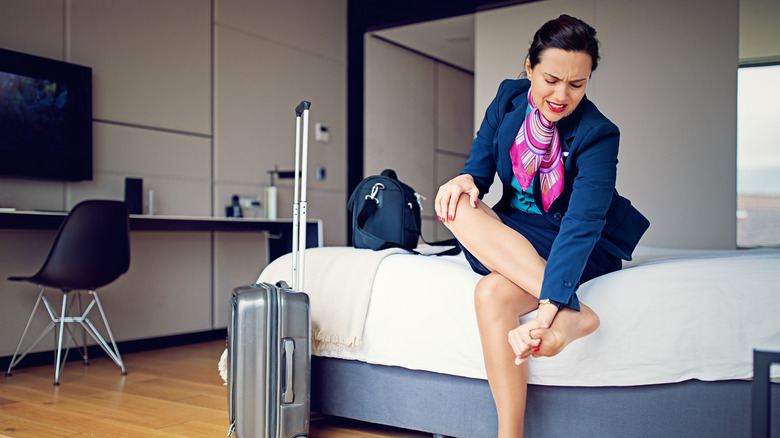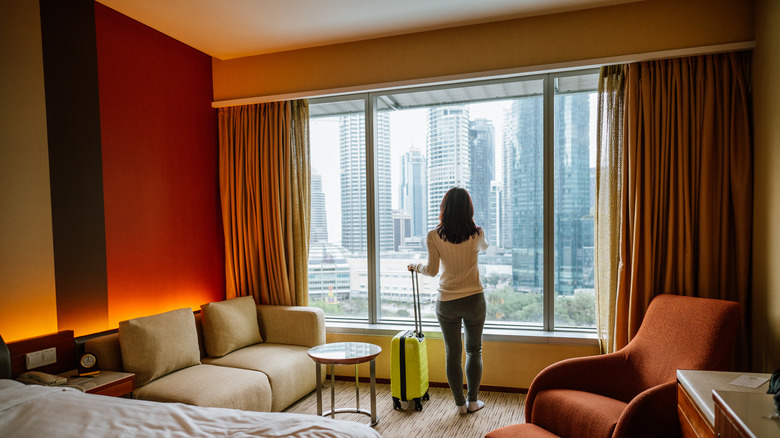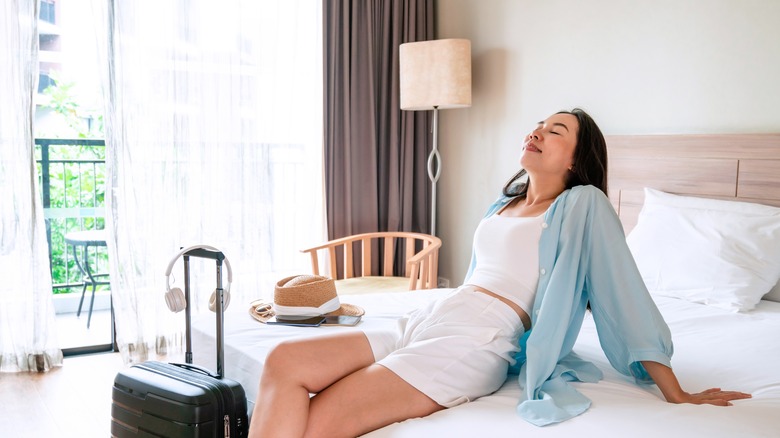The Top Hotel Safety Tips Every Traveler Needs To Live By, According To A Flight Attendant
When you consider dangerous situations while traveling, your hotel stay probably isn't the first thing to pop into your mind. Many of us have the impression that we're relatively safe in our hotels and that crime risks are low. After all, hotels can feel like secure places, especially since staff members usually work at the front desk to keep non-guests or suspicious persons from entering the premises and each guest room requires a key. So, what could go wrong?
While the risk of hotel-related crimes may be small, they still happen, and frequent travelers are the most at risk. Theft is the most common crime within hotels, but violent crimes are also a risk. However, there is no need to avoid hotel travel out of fear. Instead, take some precautions to keep yourself safe while away from home.
Diomadis Briceno has worked as a professional flight attendant for over a decade and was the former Union Chair of Safety, Health, and Security for her airline. After so many years working in the travel industry, it's safe to say she knows a thing or two about travel safety. In an exclusive interview with Explore, Bricenco shared some expert advice, like how to choose the safest room and secure your belongings during your hotel stay, so you can relax and enjoy your vacation with peace of mind.
The location of your room matters
When you book your room, consider the safest place to be in the hotel. Many airlines have regulations regarding which rooms their flight crew members can occupy during overnights in various cities in order to keep their crew members safe.
"When checking into a hotel, [it's] always a good idea to be booked into a room that isn't on [the] ground level," Diomadis Briceno told us, "doing so helps [in] eliminating entry points for unwanted guests."
Ensuring you're on the second floor or higher can help protect against intruders who could try to break in through windows or sliding doors in rooms with balconies or patios. Stay away from external exits, as they can put you at an increased risk for confrontations with criminals or thieves trying to get in and out of the hotel quickly without being noticed. To ensure you don't receive a ground-level room, you can call the hotel after you make your reservation and ensure you're assigned a room on the second story or higher.
Examine your room as soon as you arrive
After a long day of travel, you may be tempted to immediately begin unpacking and relaxing as soon as you enter your hotel room. However, be sure to take a moment to ensure your space is safe. Before you even enter your room, make a note of your nearest emergency exit, just in case you need it during your stay.
"When you arrive to your room, put the latch so the door doesn't close while you inspect your room for tampering, suspicious items, and, frankly, if anyone is in there," according to Diomadis Briceno. Leaving the door propped open is crucial. "You do this so that you can get out easily without fumbling with the door," she added.
Finding hidden cameras in reputable hotels is uncommon, but it never hurts to be overly cautious. Check for any items that may seem out of place — think smoke detectors in bathrooms or strange electronics. Look for any red lights or wires.
After you've ensured your room is secure, go ahead and lock your door and deadbolt it. You should always ensure your door is double-locked when you're inside to avoid potential break-ins.
Finally, check your room's cleanliness before you unpack. "Once your room is clear, you can do a deep dive for those pesky bed bugs by pulling back the sheets, covers and [checking] the mattress," Briceno said. She also suggested placing your belongings off the floor on the luggage holder.
Update family and friends
When you arrive at your hotel, let someone close to you know you've checked in. It's also a good idea to update them when you're coming and going from the premises.
"Sometimes we get comfortable with feeling anonymous in places," shared Diomadis Briceno. "Share your location with friends and family if possible." You can share your GPS location with a loved one back home on any smartphone if the location services are turned on. You might also consider having a daily "check-in" time and setting an alarm on your phone. When you do so, your loved ones will know when to expect to hear from you so they can quickly notify authorities if you go missing.
In addition to friends and family members at home, keep your fellow travel companions in the loop. "It's always safe to share your room number with anyone you're traveling with, but avoid sharing it out loud in [the] elevator or while on the phone," advised Briceno. You never know who might be listening.
Remove your room keys from the little sleeve with the room number written on it, and dispose of it in the trash in your room. That way, if you drop your key while out and about, no one can find out where you're staying.
Make friends with hotel employees and secure your belongings
Hotels offer many ways to keep you and your belongings safe, so take advantage of them during your stay. Make sure the hotel room telephone works by calling the front desk. Should you hear something suspicious or potentially dangerous while you're in your room, you'll want to have a direct line.
"Use the hotel safe for important documents and valuables," Diomadis Briceno suggested. Keep things locked up whenever you're away from your room. "If one isn't provided, I've used paintings to hide my passport and cash behind." Never leave belongings unsecured when you leave.
A theft can ruin an otherwise fantastic trip, so it's better to be safe than sorry. Attempt to stay under the radar while traveling. In other words, don't flash large amounts of cash or expensive jewelry when you're out and about, especially if you're traveling somewhere where theft is common. You never know who is watching and wouldn't want someone following you back to your hotel.
That said, Briceno encourages Explore readers to get to know the hotel employees as an added safety measure. "Make nice with the staff; they see hundreds of faces a day, and you want them to remember you if you were to need help or get great recommendations," she told us. Introduce yourself to the people working at the front desk when shifts change, and give them a friendly greeting as you're coming and going from the hotel.
Take extra precautions when traveling abroad
Remember that crime can happen anywhere, even when traveling close to home or a destination you've visited repeatedly. Always trust your gut, and use common sense and good judgment. That being said, it's a good idea to take extra precautions if you're traveling outside your country of residence, according to Diomadis Briceno.
"Traveling abroad can be intimidating, so I enrolled in the STEP program. [T]his program allows you to insert information of where you are staying and emergency contact information. [It] also keeps you updated on travel advisories," she told us. The STEP program is entirely free to U.S. citizens and ensures your trip is on record with the nearest United States Embassy. They will be the ones who can help protect you should an emergency arise at home or in the country you're visiting during your trip.
"... you're there to have fun," Briceno reminded us, "but stay vigilant ..." Be aware of your surroundings and take these simple precautions to ensure your hotel stay is safe and stress-free.





